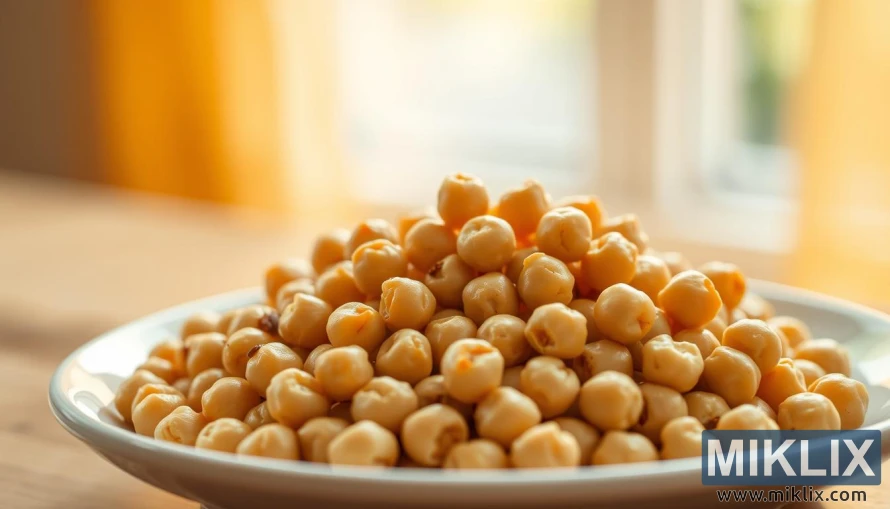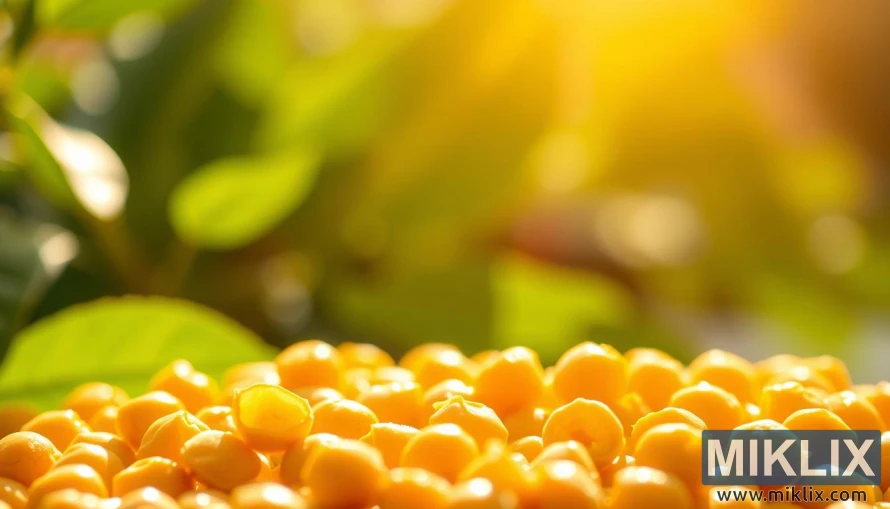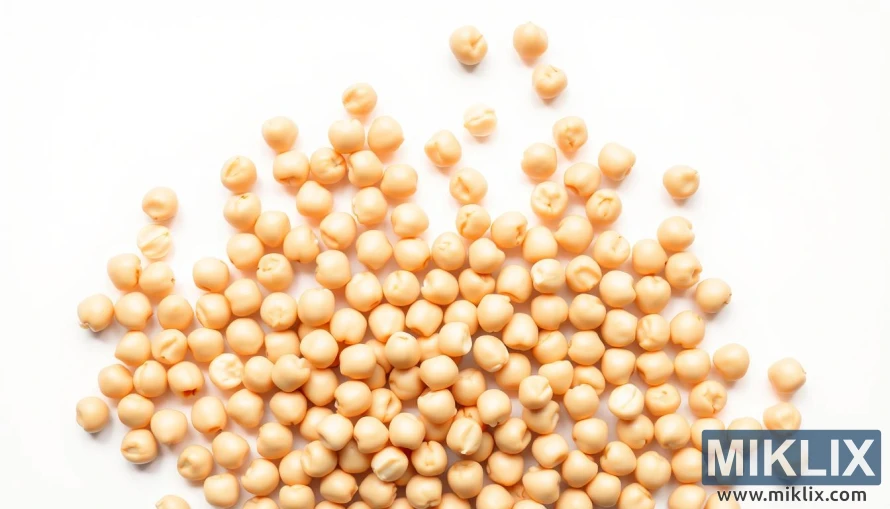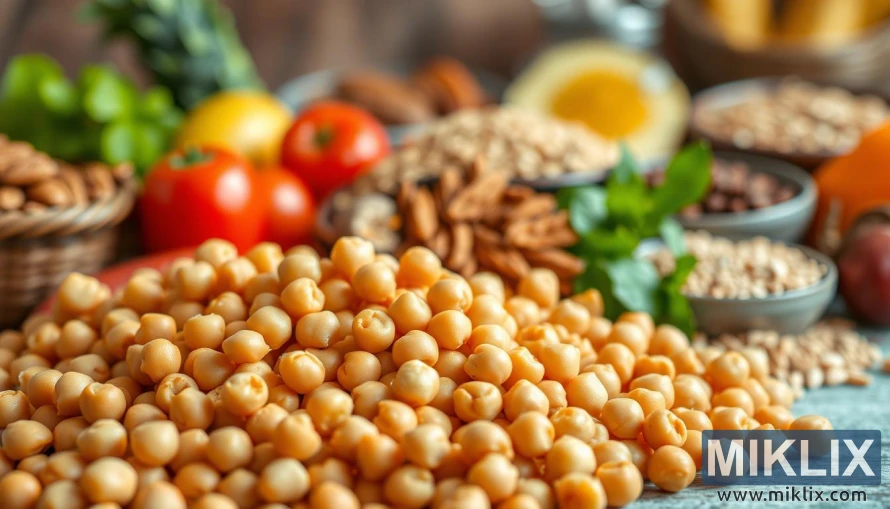From Hummus to Health: How Chickpeas Fuel a Healthy Life
Published: May 15, 2025 at 11:48:42 AM UTC
Last updated: December 25, 2025 at 12:06:38 PM UTC
Chickpeas, also known as garbanzo beans, have been a key part of Middle Eastern food for thousands of years. They are loved for their nutty taste and grainy texture. But they're more than just tasty; they're also super nutritious. These legumes are full of vitamins, minerals, and fiber. They help with weight control, improve digestion, and lower the risk of serious diseases. For those who follow vegetarian or vegan diets, chickpeas are a great protein source. Let's explore how these small beans can boost your diet and life.

Key Takeaways
- Chickpeas are rich in essential nutrients that support overall health.
- They can help with weight management by keeping you full longer.
- Chickpeas are a great source of plant-based protein.
- Regular consumption may aid in regulating blood sugar levels.
- They promote digestive health due to their high fiber content.
- Chickpeas can reduce the risk of chronic diseases.
Introduction to Chickpeas and Their History
Chickpeas, also known as Cicer arietinum L., are part of the legume family. They are related to kidney beans and peanuts. Their history goes back to around 3500 B.C. in Turkey and even earlier, to 6970 B.C. in France.
This long history shows how important chickpeas have been in human diets and farming. They were one of the first legumes to be farmed. Their ability to adapt and their nutritional value helped them spread across cultures.
Today, chickpeas are grown in over 50 countries. They are a key crop worldwide. This shows their importance in modern farming.
There are two main types of chickpeas: Kabuli and Desi. The Kabuli is big, round, and tan. It's mainly found in the U.S. The Desi is smaller and darker, grown in places like the Middle East and India.
India is the biggest producer of chickpeas today. This highlights their value and adaptability in farming.
Packed with Nutrients
Chickpeas are a nutrient-dense food, loved by many for their nutritional value. A single cup, weighing 164 grams, has about 269 calories. Most of these calories come from carbohydrates, making up 67% of the total.
This versatile legume is packed with 14.5 grams of protein and 12.5 grams of fiber. It's a great source of protein and fiber.
Chickpeas are also rich in essential vitamins that are key to good health. They provide a variety of necessary minerals, including:
- Manganese (74% daily value)
- Folate (71% daily value)
- Copper (64% daily value)
- Iron (26% daily value)
This impressive array of minerals makes chickpeas a powerful addition to any diet. Adding chickpeas to meals not only adds flavor but also boosts nutritional intake. They are a favorite among health-conscious individuals.
May Keep You Feeling Full
Chickpeas are great for controlling your appetite. They are full of protein and fiber. This makes them a top pick for meals that help you feel full.
Research shows that chickpeas make you feel fuller than white bread. This is because they slow down digestion and send signals to your brain that you're full.
Adding chickpeas to your meals can help you eat less. You'll feel satisfied for longer. This can lead to eating fewer calories.
Rich in Plant Protein
Chickpeas are a great source of plant-based protein, with about 14.5 grams per serving. They are perfect for those on a vegan diet. Their protein content is higher than many other legumes, making them a key part of vegetarian meals.
Chickpeas provide high-quality protein that helps build muscles and manage weight. Even though they lack methionine, an essential amino acid, pairing them with grains like quinoa fixes this. This combination ensures a balanced diet for those who don't eat animal products.
May Aid in Weight Management
Adding weight management chickpeas to your meals can help with dieting. These legumes are packed with nutrients that aid in losing weight. Their fiber and protein make you feel full, cutting down on snacking.
Research finds that eating chickpeas can lead to a lower BMI and smaller waist sizes. People who eat a variety of legumes tend to do better with weight loss. Chickpeas are a great choice for anyone trying to control their weight because they keep you feeling full.
Support for Blood Sugar Regulation
Chickpeas are great for controlling blood sugar. They have a low glycemic index, which helps regulate blood sugar. Their high fiber and protein content slow down digestion and absorption.
This slows down the rise in blood sugar levels after eating. Studies show that chickpeas can lower blood glucose levels. They are better than foods with a higher glycemic index.
Eating chickpeas regularly may help prevent or manage diabetes. It can also lead to lower insulin levels. This is key for managing diabetes.

Benefit for Digestion
Chickpeas are great for your digestive health. They are full of fiber, which helps your bowels move regularly. This is key for good digestion. The fiber in chickpeas, like raffinose, also supports healthy gut bacteria. This is good for your overall gut health.
Eating chickpeas can help with digestive problems. If you have irritable bowel syndrome (IBS), chickpeas' fiber can make symptoms better. They can also help prevent colon cancer, making them a vital part of a healthy diet.
Chickpeas and Reduced Risk of Chronic Diseases
Chickpeas are key in preventing chronic diseases like heart disease and cancer. They are full of magnesium and potassium, which help control blood pressure. These minerals keep our heart system healthy.
Chickpeas also have soluble fiber that lowers bad cholesterol. This is good for our heart.
Chickpeas do more than just provide nutrients. Eating them regularly might lower cancer risk. They help make butyrate, a fatty acid that fights inflammation. This could help reduce cell growth and lower cancer risk.
May Promote Brain Health
Chickpeas are packed with nutrients that help our brains. They have choline, which is key for making neurotransmitters. These chemicals are vital for memory, mood, and muscle control.
Chickpeas also have magnesium and selenium. These minerals help keep our brains sharp and reduce anxiety and depression. While more studies are needed, the current research shows a strong link between chickpeas and better brain function.

Help Prevent Iron Deficiency
Chickpeas are a great source of iron, with one serving giving about 26% of what you need daily. This is good news for vegetarians and anyone who eats less animal protein. Iron is key for making red blood cells, which is important for staying healthy.
Vitamin C in chickpeas helps your body absorb more iron. This makes chickpeas a smart choice for fighting anemia. Adding chickpeas to your meals can make your food taste better and give you more iron. They're a tasty way to get more iron from plants.
Inexpensive and Easy to Incorporate into Your Diet
Chickpeas are very affordable and can fit into any budget. They come in dried and canned forms, making meal planning easy. Cooking chickpeas opens up many possibilities for different dishes.
These legumes are great as a meat substitute because of their high protein. They're perfect for vegetarian and vegan diets. Here are some ways to enjoy chickpeas:
- Adding them to salads for extra crunch and nutrition
- Using them in soups for added heartiness
- Mashing or pureeing them into hummus for a delightful dip
- Roasting chickpeas for a crispy, healthy snack
These recipes show how versatile chickpeas can be in various cooking styles and cuisines. With their affordability and versatility, adding chickpeas to your meals is easy.
Precautions When Eating Chickpeas
Chickpeas are good for your health, but there are some things to watch out for. Canned chickpeas might have saponins and BPA. These can be harmful if you eat too much or don't rinse them well.

If you're allergic to legumes, chickpeas might not be safe for you. Allergies can cause serious reactions. Start with a small amount to see how you react. This way, you can avoid stomach problems.
Remembering these tips can make eating chickpeas safer and more enjoyable.
The Environmental Impact of Chickpeas
Chickpeas are great for the environment. They help make farming more sustainable. One big plus is they need less water than many other foods.
Chickpeas also make the soil better by fixing nitrogen naturally. This means they can grow without needing lots of chemical fertilizers. Growing chickpeas helps farmers and the planet.
Eating chickpeas means we use less animal products. This is good for the planet and for farming. Adding chickpeas to our meals is good for us and the Earth.
Chickpeas in Global Cuisine
Chickpeas are a big deal in global cuisine. They're loved for their versatility and health benefits. They're a key ingredient in many dishes around the world.
In the Middle East, chickpeas are a star in hummus and falafel. They add a creamy texture and a strong flavor. This makes them a favorite in many dishes.
In India, chickpeas are a big part of chana masala, a spicy curry. They show off their savory side. Chickpeas can be cooked in many ways, like boiling, roasting, or blending into soups and sauces.
Chickpeas are also used in salads, veggie burgers, and even baked goods. They're a great choice for vegetarians and vegans. This makes them popular with many people.

Conclusion
Chickpeas are packed with nutrients that boost our health. They are great for our digestive system and help with weight control. They are full of fiber and protein, keeping us full longer.
Chickpeas also fight against heart disease and diabetes. They are easy to add to many dishes, making meals tasty and healthy. Plus, they are affordable, making them a smart choice for a healthy diet.
In short, chickpeas are more than just a food; they are a key to a healthy life. Adding them to our meals can greatly improve our health. They make eating fun and nutritious, all while being budget-friendly.
Further Reading
If you enjoyed this post, you may also like these suggestions:
- Broccoli Gains: The Cruciferous Key to Better Health
- The Amino Acid Advantage: L-Arginine’s Role in Circulation, Immunity, and Endurance
- Stronger with Spinach: Why This Green is a Nutritional Superstar
